- Home
- Maggie Stiefvater
Wolves of Mercy Falls 03 - Forever Page 20
Wolves of Mercy Falls 03 - Forever Read online
Page 20
And I saw Tom Culpeper looking after me, not vindictive. Just a raw wound reopened too frequently to ever heal. How could I judge him? He didn’t know the truth. He couldn’t know. He thought they were nothing but animals, and us careless neighbors with misplaced priorities.
But I also saw this: It would not stop until we were dead.
Koenig took my arm and looked over his shoulder at Culpeper. “I think you are confusing the son with the father, Mr. Culpeper.”
“Maybe,” Culpeper said. “You know what they say about apples and trees, though.”
The thing about that saying was that it was pretty true.
Koenig said, “It’s time to go.”
CHAPTER THIRTY-EIGHT
• GRACE •
Sam was late coming home.
I wouldn’t be worried.
Without him, I was restless and useless in Beck’s house; at least when I was a wolf, I didn’t feel my lack of purpose and goal so strongly. I’d never realized just how much of my day, before, was filled with homework and cooking and planning crazy things with Rachel and yet more homework and Olivia and library visits and repairing the loose board on the deck because Dad would never get around to it. Reading was a reward for work, and without work, I couldn’t seem to settle down with a book, though Beck’s basement was full of them.
All I’d thought about before was graduating with good enough grades that I didn’t have to worry about where I went to college. And then, after I’d met Sam, keeping him human was added to that list.
Now, neither of those things really applied.
I had so much free time that free time was meaningless. I felt like I did on school breaks. Mom had said once that I didn’t know how to have downtime and that I should be sedated when I didn’t have school. I had thought that was a little harsh of her, but now, it made sense.
I washed the six articles of clothing I had at Beck’s house, cleaned the backlog of dishes in the sink, and finally, I called Isabel because I couldn’t call anybody else and if I didn’t talk to someone, I’d start crying about Olivia and that wouldn’t do anybody any good.
“Tell me why it’s a bad idea to tell Rachel I’m alive,” I said as soon as Isabel picked up her phone.
“Because she will go crazy and then break down and make a scene and eventually her parents will find out and she won’t lie and then everyone will know,” Isabel said. “Any other questions? No.”
“Rachel can be sensible.”
“She just found out that one of her friends had her throat torn out by wolves. She won’t be sensible.”
I didn’t say anything. The only thing that kept me sane was keeping Olivia’s death abstract. If I started thinking about how it had happened, how it couldn’t have been quick, how she didn’t deserve to die — if I started thinking about what it had felt like to lie in the snow and have my skin jerked off my bones by wolves, imagining that Sam hadn’t been there to stop them — I couldn’t believe that Isabel had said it. I wanted to hang up right then. The only thing that kept me on the phone was the knowledge that if I hung up, I’d be all alone with that image of her death rolling around in my head again and again.
Isabel said, “At least that’s how I was with Jack. Sensible is not a word I would’ve used for myself.”
I swallowed.
“Grace, don’t take it so personally. It’s fact. The sooner that you get a grip on the facts, the better you’ll be. Now stop thinking about it. Why do you want to tell Rachel?”
I blinked until my eyes were clear. I was glad Cole wasn’t here. He thought that I was some sort of iron maiden and I didn’t like to convince him otherwise. Only Sam was allowed to see what a mess I really was, because Sam knowing felt like me knowing. I told Isabel, “Because she’s my friend and I don’t want her thinking I’m dead. And because I’d kind of like to talk to her! She’s not as silly as you think.”
“So sentimental,” Isabel said. Not in a mean way. “You asked me to tell you why it was a bad idea, and I did. I’m not going to change my answer.”
I sighed. It was uneven and conveyed more unhappiness than I meant for it to.
“Fine,” Isabel snapped, as if I’d yelled at her. “Talk to her. Don’t blame me if she can’t handle the truth.” She laughed then, at some joke that only she got, before going on. “I wouldn’t tell her the wolf part, only the alive part. I mean, assuming you listen to me.”
“I always listen to you. Except when I don’t.”
“There’s the old Grace. That’s better. I was starting to think you’d become completely lame.”
I smiled then, to myself, because it was the closest I’d get to emotional truth from Isabel. Then another thing occurred to me.
“Could you do something else for me?” I asked Isabel.
“It never ends.”
“Well, I don’t know how else to find out. I don’t even know if you can find this out without making people suspicious. But if anyone could, you could.”
“Keep the compliments coming, Grace. Every bit helps.”
“Your hair is also really nice,” I said, and she laughed her hard laugh. “I want to know if I could still graduate, if I did summer school.”
“Wouldn’t that require you to be human? Not that some of the mouth-breathers there this year seem to be.”
“I’m getting there,” I said. “I think I could make it work. Once I get unmissing.”
“You know what you need?” Isabel asked. “A good lawyer.”
I’d already thought about it. I wasn’t sure what Minnesota State Law said about runaways, which was what I was sure to be classified as. It seemed incredibly unfair that I might end up with a mark on my record because of this, but I’d deal with it. “I know this girl whose father is one.”
Now Isabel really laughed. “I’ll find out,” she said. “Only you would be concerned about finishing high school while you’re turning into another species in your spare time. It’s slightly refreshing to see that some things never change. Geek. Nerd. Teacher’s pet. Oh — pet — that has become funny now that you grow fur.”
“I’m glad I could amuse you,” I said, pretending to be hurt.
Isabel laughed again. “Me, too.”
CHAPTER THIRTY-NINE
• SAM •
This time, Koenig gestured for me to ride in the front seat of the police car. The car had gotten hot under the unmitigated attention of the sun, and Koenig combated the heat by cranking the air-conditioning on full blast. It was so cold that little drops of moisture kept hitting my face. The wolf that must still be inside me didn’t stir. Everything smelled like pine cleaner.
Koenig turned off the radio. It was playing ’70s rock.
I was thinking about Culpeper shooting my family from a helicopter.
The only sound in the car was the occasional crackle of the radio clipped on Koenig’s shoulder. My stomach growled, audibly, and Koenig leaned across me to let the glove box fall open into my knees. There was a package of crackers in there, and two candy bars.
I took the crackers.
“Thanks,” I said. They hadn’t been offered in such a way that gratitude felt uncomfortable.
Koenig didn’t look at me. “I know that Heifort was wrong,” he said. “I know what the common factor is, and it’s not you.”
I realized that he had not turned toward the bookstore. We were headed away from Mercy Falls, not toward it.
“Then what is it?” I asked. There was something like anticipation hanging in the air. He could have said Beck or Boundary Wood or anything, really. But I didn’t think he was going to.
“The wolves,” Koenig said.
I held my breath. The dispatcher’s voice, fuzzy, crackled over the radio. “Unit Seventeen?”
Koenig pressed a button on the radio and leaned his head toward his shoulder. “I’m en route with a passenger. Will call when I’m clear.”
“Ten-four,” she replied.
He waited a moment, and then he said, still
not looking at me, “Now tell me the truth, Sam, because there is no more time for dancing around it. Tell me now, the truth, not what you told Heifort. Where is Geoffrey Beck?”
The tires were loud on the road. We were nowhere near Mercy Falls. Trees flew by us, and I remembered the day I drove to get Grace from the tackle shop. It seemed like a million years ago.
There was no way I could trust him. There was no way that he was prepared for the truth, and even if he was, this was our number one rule: We didn’t tell anyone about ourselves. Especially not an officer of the law who had just been standing in the room while I was accused of kidnapping and murder.
“I don’t know,” I muttered. Barely audible over the road noise.
Koenig set his mouth and shook his head. “I was there at the first wolf hunt, Sam. It wasn’t legal, and I regret it. The whole town was choking on Jack Culpeper’s death. I was there when they drove them through the woods to get them up against the lake. I saw a wolf that night and I have never, ever forgotten it. They are going to drive those wolves from the woods and shoot every single one of them from the air, Sam, and I saw the paperwork to prove it. Now I am going to ask you again, and you are going to tell me the truth because you and the wolves are out of options except for me. Tell me straight, Sam. Where is Geoffrey Beck?”
I closed my eyes.
Behind my eyelids, I saw Olivia’s dead body. And I saw Tom Culpeper’s face.
“He’s in Boundary Wood.”
Koenig let out a long, long hiss of breath between his teeth.
“Grace Brisbane, too,” he said. “Right?”
I didn’t open my eyes.
“And you,” Koenig said. “You were there. Tell me that I am crazy. Tell me I am wrong. Tell me that when I saw a wolf that night with Geoffrey Beck’s eyes, I was wrong.”
Now I opened my eyes. I had to see what his face looked like when he said this. He was staring straight through the windshield, eyebrows drawn together. The uncertainty made him younger; made the uniform less daunting.
“You’re not wrong,” I said.
“There is no cancer.”
I shook my head. Koenig didn’t turn his head, but he nodded a tiny nod, as if to himself.
“There are no leads on Grace Brisbane not because she disappeared, but because she is —” Koenig stopped himself. He couldn’t say it.
I realized that I was letting a lot ride on this moment. On whether or not he finished this sentence. Whether he grabbed the truth like Isabel had, or whether he pushed it away or warped it to fit some religion or changed it to match a less strange worldview, like my parents had.
I kept looking at him.
“A wolf.” Koenig kept his eyes on the road, but his hands twisted around the steering wheel. “We cannot find her or Beck because they’re wolves.”
“Yes.”
Koenig shook his head. “My father used to tell me wolf stories. He told me he had a friend in college who was a werewolf, and we used to laugh at him. We could never tell if he was telling a story or telling the truth.”
“It’s true.” My heart was thudding with our secret hanging out there between us. Suddenly, in light of his suspicions, I was replaying every conversation I’d had with Koenig. I was trying to see if it changed how I saw him, and it didn’t.
“Then why — I cannot believe I am asking this, but why are they staying wolves if the pack is about to be eliminated?”
“It’s involuntary. Temperature based. Wolf in winter, human in summer. Less time every year, and eventually we stay a wolf forever. We don’t keep our human thoughts when we shift.” I frowned. This explanation was getting less true every day that we spent with Cole. It was a strangely disorienting feeling, to have something you’d relied on for so long start to change, like finding out that gravity no longer worked on Mondays. “That’s grossly oversimplified. But it’s the basic rules of it.” I felt weird saying grossly oversimplified, too; a phrase like that was only because Koenig spoke so formally.
“So Grace —”
“Is missing because she’s still unstable in this weather. What is she supposed to tell her parents?”
Koenig considered. “Are you born a werewolf?”
“No, good old horror movie technique. Biting.”
“And Olivia?”
“Bitten last year.”
Koenig snorted softly. “Just incredible. I knew it. I kept finding things that led me back to that, and I could not believe it. And when Grace Brisbane disappeared out of the hospital and left just that bloody hospital gown behind … they said she was dying, that there was no way that she could have left under her own power.”
“She needed to shift,” I said softly.
“Everyone in the department blamed you. They have been looking for a way to crucify you. Tom Culpeper more than anyone. He has Heifort and everyone else lapping out of a bowl.” Now he sounded a little bitter, and it made me look at him in an entirely different way. I could see him out of uniform, at home, getting a beer out of the fridge, petting his dog, watching TV. A real person, something separate from the uniformed identity I’d assigned him. “They would very much like to hang you with this.”
“Well, that’s great,” I said. “Because all I can do is tell them I didn’t do anything. Until Grace gets stable enough to reappear. And Olivia …”
Koenig paused. “Why did they kill her?”
My head was full of Shelby, her eyes on me through the kitchen window, the desperation and anger I thought I’d seen there. “I don’t think there was a ‘they.’ There’s one wolf that has been behind all of the problems. She attacked Grace before. She attacked Jack Culpeper, too. The others wouldn’t kill a girl. Not near summer. There are other ways to get food.” I had to try, very deliberately, to push away the memory of Olivia’s destroyed body.
We rode in silence for a minute or two.
“So, this is the situation,” Koenig said, and I was kind of charmed, now, to see that he sounded like a cop no matter what he said. “They have clearance to eliminate the pack. Fourteen days is not very long. You are telling me that some of them probably will be unable to shift before then, and some of them cannot shift at all. So we’re talking mass murder.”
Finally. It was relieving and terrifying to hear Culpeper’s plan defined as such.
“And there are not many options here. You could reveal the wolves for what they are, but —”
“I don’t think that’s a good idea,” I said hurriedly.
“—I was going to say that I do not think that is feasible. Telling Mercy Falls that they have a pack of wolves carrying an incurable infectious disease right after we discover that they have killed a girl …”
“Won’t end well,” I finished.
“And the other option is to try to motivate more animal rights groups to save the pack as wolves. It didn’t work in Idaho, and I think the time frame will be impossible, but …”
I said, “We thought of moving them.”
Koenig stilled. “Go on.”
I stumbled over the words. Koenig was so precise and logical that I felt, again, as if I needed to match it. “Someplace farther away from people. But then … it could just put us in a worse situation, unless we know what the people are like. And I don’t know what the pack will be like in a new place, without boundaries. I don’t know if I should try to sell Beck’s house to buy land, or what. There’s not enough money to buy a complete territory. Wolves range hugely, over miles and miles. So there’s always a chance of trouble.”
Koenig drummed his fingers on the wheel, eyes narrowed. A long moment of silence went by. I was glad of it. I needed it. The ramifications of my confession to Koenig felt unpredictable.
“I am just talking as I’m thinking,” Koenig said finally, “but I have property, a few hours farther up in the Boundary Waters. It was my father’s, but I just inherited it.”
I started, “I … don’t …”
“It’s a peninsula,” Koenig interrupted me. “Prett
y big one. Used to be an old resort, but that’s all shut down because of old family politics. The end of it is fenced off. Not the best of fence, just box wire between trees in some places, but it could be reinforced.”
He glanced over at me at the same time that I looked at him, and I knew we were both thinking: This might be it.
“I don’t think a peninsula, even a big one, would be big enough to support the pack. We’d have to feed them,” I said.
“So you feed them,” Koenig said.
“And are there campers?” I asked.
“It faces mining land,” Koenig replied. “Mining company hasn’t been active since sixty-seven, but they hold on to the land. There’s a reason why the resort didn’t make it.”
I chewed my lip. It was hard to believe in hope. “We’d still have to get them there, somehow.”
“Quietly,” Koenig advised. “Tom Culpeper won’t consider relocation an alternative to their deaths.”
“And quickly,” I said. I was thinking about how long Cole had been unsuccessfully trying to trap wolves, however, and how long it would take to catch twenty-odd wolves and how we would transport them hours north.
Koenig was silent. Finally, he said, “Maybe it’s not a good idea. But you can consider it an option.”
An option. Option meant a plausible course of action, and I wasn’t sure it was even that. But what else did we have?
CHAPTER FORTY
• GRACE •
The interminable day finally ended when Sam came home with a pizza and an uncertain smile. Over the pizza, Sam told me everything that Koenig had said. We sat cross-legged on the floor of his room, his desk lamp and Christmas lights turned on, the pizza box between us. The desk lamp was next to the one sloping wall by the roof, and the way the wall diverted the light made the room seem warm and cavelike. The CD player by Sam’s bed was turned on, low, some smoky voice singing to a piano.

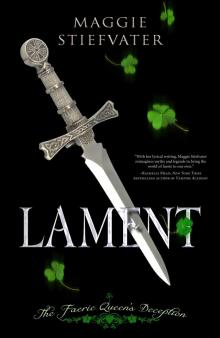 Lament: The Faerie Queens Deception
Lament: The Faerie Queens Deception Sinner
Sinner The Dream Thieves
The Dream Thieves All the Crooked Saints
All the Crooked Saints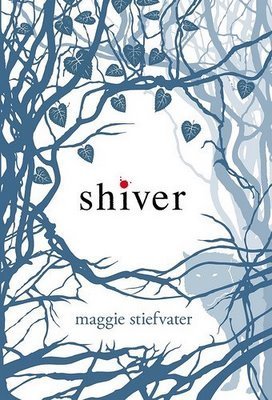 Shiver
Shiver Forever
Forever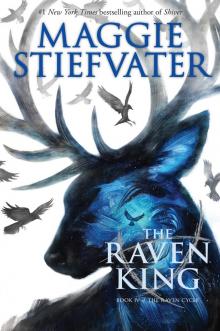 The Raven King
The Raven King Opal
Opal Linger
Linger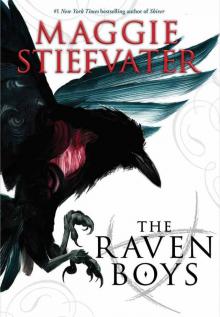 The Raven Boys
The Raven Boys The Scorpio Races
The Scorpio Races Hunted
Hunted Ballad: A Gathering of Faerie
Ballad: A Gathering of Faerie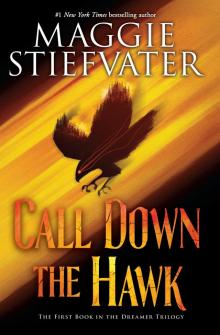 Call Down the Hawk
Call Down the Hawk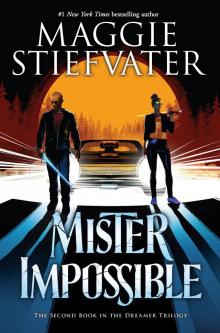 Mister Impossible
Mister Impossible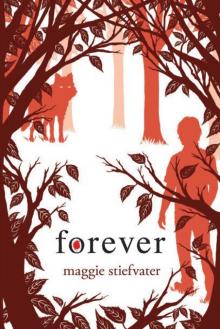 Wolves of Mercy Falls 03 - Forever
Wolves of Mercy Falls 03 - Forever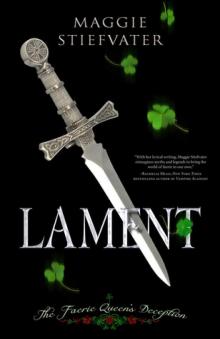 Lament
Lament![Maggie Stiefvater - [Wolves of Mercy Falls 02] Read online](http://i1.bookreadfree.com/i1/04/04/maggie_stiefvater_-_wolves_of_mercy_falls_02_preview.jpg) Maggie Stiefvater - [Wolves of Mercy Falls 02]
Maggie Stiefvater - [Wolves of Mercy Falls 02] Lament: The Faerie Queen's Deception
Lament: The Faerie Queen's Deception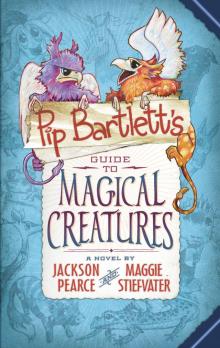 Pip Bartlett's Guide to Magical Creatures
Pip Bartlett's Guide to Magical Creatures Ballad
Ballad